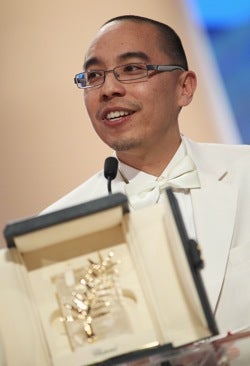In today’s final roundup of Cannes news ‘n’ notes from around the web, everybody tries to make sense of this year’s lineup, and of the unusual Palme d’Or winner.
Who are Apichatpong Weerasethakul and Uncle Boonmee, and why did the Thai filmmaker and his creation win the top prize at Cannes? For starters, says Salon’s Andrew O’Hehir, he lets Western journalists call him Joe. Then O’Hehir tries his best to describe Joe’s aesthetic: “He takes fragments of stories and sets them adrift on his own stream of luscious images, and like a kid releasing boats made of leaves and twigs, he’s not overly concerned about where they end up.” The synopsis of “Uncle Boonmee Who Can Recall His Past Lives” doesn’t exactly make sense of the story, but its various components – a runaway water buffalo, a princess who mates with a talking catfish, ghost-monkeys – sound pretty awesome (and nuts) to me. The cautionary conclusion: “[C]inema is a public art if it’s anything at all, and Apichatpong Weerasethakul is dangerously close to becoming a great artist — or one celebrated as such — without a public audience.” (Salon)
 A few days ago, the Hollywood Reporter let Weerasethakul explain himself; he started by saying that he thinks the film is “pretty universal.” He also said it has a lot to do with Thai beliefs in reincarnation and ghosts. The interview then gets political, takes a sidetrip to Chicago (turns out he lived there for three years in the 1990s) and ends on sexuality. (The Hollywood Reporter)
A few days ago, the Hollywood Reporter let Weerasethakul explain himself; he started by saying that he thinks the film is “pretty universal.” He also said it has a lot to do with Thai beliefs in reincarnation and ghosts. The interview then gets political, takes a sidetrip to Chicago (turns out he lived there for three years in the 1990s) and ends on sexuality. (The Hollywood Reporter)
Manohla Dargis appears to be delighted (and shocked, and exhilarated) by the Palme d’Or winner, which she calls “the single most adventurous film in the competition.” And she offers advice to anyone who might want to see “Uncle Boonmee” when it eventually finds its way to these shores: “You need to shake loose all your preconceived ideas about how and why movies make meaning and just plunge in.” (The New York Times)
(Weerasethakul photo by Sean Gallup/Getty Images)
Anne Thompson looks at the winners and assesses their stateside chances. Though it hasn’t landed a deal yet, “Biutiful” will definitely get a release, she says (“even if its makers have to pay for it”) – and she thinks that star Javier Bardem, and actress Lesley Manville from the unrewarded “Another Year,” both have a shot at Oscar nominations. Otherwise, she says, “we’re looking at foreign film contenders from SPC and IFC, per usual.” And while I haven’t seen “Uncle Boonmee,” it does not sound like the kind of thing Academy’s foreign-language voters go for, though the Palme d’Or may carry some weight with the smaller blue-ribbon committee that helps stock the shortlist. (Thompson on Hollywood)
After exhaustively covering the festival with a team of reporters, indieWIRE’s Eugene Hernandez gives his roundup on a festival whose films, he says, repeatedly combined the personal and the political. And at the end of a fest where one of the most notable personalities was 101-year-old director Manoel de Oliveira, he quotes Palme d’Or winner Weerasethakul: “It’s such a young medium, so I hope that [this award] will be an inspiration for young people to try new ways.” (indieWIRE)
Sasha Stone, who certainly wins Rookie of the Year when it comes to reporters in Cannes, examines what has become a central question of the festival for those (like Stone and Jeff Wells) who were big fans of Alejandro Gonzalez Inarritu’s “Biutiful”: why all the haters? She sort of decides that the movie expresses her (significantly pessimistic) outlook on life, and that’s why she likes it so much. And more cheerful people, she concludes, have the right not to like it. (Awards Daily)
Stone also quotes a Cannes piece by Entertainment Weekly’s Owen Glieberman, who cavalierly divides all Palme d’Or winners into two categories: ones that deserve it (by which he means “Taxi Driver,” “sex, lies and videotape,” “4 Months, 3 Weeks and 2 Days,” and others he likes), and ones that don’t (ie., “The Mission,” “Farewell My Concubine,” “Paris, Texas” and last year’s winner, “The White Ribbon”). I can’t argue with him about “Biutiful” until I’ve seen it, but calling “Paris, Texas” undeserving? Them’s fightin’ words. (Entertainment Weekly)
Steven Zeitchik starts his Cannes overview with a look at what was missing – or, to be more precise, who was missing: “Robin Hood” director Ridley Scott, “Fair Game” star Sean Penn, and “Film Socialisme” director and Cannes icon Jean-Luc Godard. (I’d say a bigger hole might have been Terrence Malick, whose “The Tree of Life” clearly would have been a centerpiece of the fest if he had finished it on time.) As a result, he says, “this year’s festival was in many ways defined by the personalities below the radar.” (24 Frames)


